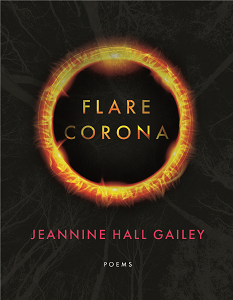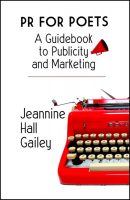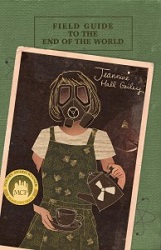Field Guide to the End of the World
by Jeannine Hall Gailey
Winner of the 2015 Moon City Poetry Award and the 2017 Elgin Award.
Gailey allies herself with the mutants of the world—from zombie stripper clones to teen girl vampires—but unlike them, she is haunted by the possibility of the world and the self coming to an end.
Jeannine Hall Gailey’s Field Guide to the End of the World delivers a whimsical look at our culture’s obsession with apocalypse, as well as a thoughtful reflection on our resources in the face of disasters both large and small, personal and public. Her pop culture characters—from Martha Stewart and Wile E. Coyote to Zombie Strippers and Teen Vampires—deliver humorous but insightful commentary on survival and resilience through poems that span imagined scenarios that are not entirely beyond the realm of possibility. The characters presented face their apocalypses in numerous ways, from strapping on rollerblades and swearing to do more than survive to taking notes as barns burn on the horizon. At the end of the world, the most valuable resource is human connection—someone holding our hands, reminding us “we are miraculous.”
Field Guide to the End of the World, Jeannine Hall Gailey’s fifth collection of poems, was winner of the 2015 Moon City Poetry Award. It was also the winner of the 2017 Elgin Award from the Science Fiction Poetry Association, and it was a finalist for the 2016 Bram Stoker Award in poetry from the Horror Writer’s Association.
Pricing and Availability
Field Guide to the End of the World (Moon City Press, 2016) is a softcover book with a list price of $14.95; it is available from the following locations:
- Get a copy signed by the author (check or PayPal).
- From Amazon.com.
- Direct from the publisher via The University of Arkansas Press.
An eGalley version of Field Guide to the End of the World is available for potential reviewers, on request.
Praise for Field Guide to the End of the World
In Field Guide to the End of the World, Jeannine Hall Gailey allies herself with the mutants of the world—from zombie stripper clones to teen girl vampires—but unlike them, she is haunted by the possibility of the world and the self coming to an end. Wry, heartsick and shot through with black humor (‘Martha Stewart’s Guide to Apocalypse Living’ dispenses advice on ‘storing munitions in attractive wicker boxes’), these poems about transformation and extinction mournfully remind us via post-apocalypse postcards, notes and instructions, ‘we were not here first, we will not be here last.'”
—Matthea Harvey, author of Modern Life
The end of the world has never been so full of life. Field Guide to the End of the World continues to showcase Gailey’s masterful and inimitable talent for marrying the sublime world of imagination with the gritty flesh of reality. This collection is the latest opus of a poet at the height of her powers.”
—Jason Mott, New York Times Best-selling author of The Returned
Jeannine Hall Gailey’s Field Guide to the End of the World is a smart, dark confrontation of catastrophe—what it means for a culture, and what it means for the individual. Martha Stewart gathers drones and lemons, and reminds us, ‘Survival skills are just like hostess skills.’ But can one person’s regressive malfunction can be another’s progressive mutation? Invoking fairy tales and science fictions in equal measure, the author prods at what it means when ‘Your body is the tower you long to escape’ and, on a later page, ‘Like a radio some of my connections have gone bad fizzled.’ These poems are mesmerizing in their music, their humor, and their eye for the exact right details to inspire hope while acknowledging ruin. The last love poem still conspires to bake cookies, to plant dahlias. ‘If I smell the air I can believe,’ declares the joyfully defiant ‘Post-Apocalyptic Postcard from Appalachian Chalet.’ I’ve gravitated to peri-apocalyptic narratives for as long as I could read, and followed Gailey’s work for over a decade, and I can say without hesitation: this is the best of both.”
—Sandra Beasley, author of Count the Waves and I Was the Jukebox
Jeannine Hall Gailey’s Field Guide to the End of the World crackles with wit, wonder, and wisdom. Her primer for the end days shows us how the world is always ending—there are plenty of disasters to go around. But these poems aren’t a slog through the wasteland. They’re funny, thoughtful meditations on how each of us survives the world’s end—every single day of our lives.”
—Ryan Teitman, author of Litany for the City
Syfy meets HGTV, meets Discovery, Jeannine Hall Gailey’s poems read like well-made engines, muscled and tuned-up to carry her readers safely through the many disasters always cycloning the ‘I.’ Equal parts hilarious and heartfelt, Field Guide to the End of the World is high definition poetry for the current century.”
—Marcus Wicker, author of Maybe the Saddest Thing
Reviews and Features
[Field Guide] is as timely and timeless as any volume of poems could be. It belongs in your toolbox, your backpack, your attic or your storm cellar or your secret room under the stairs—a provision to help you fend off fear with preparation. But you’ll want two copies—another for your coffee table or your nightstand, somewhere close at hand. Think of it as a talisman to have at the ready the next time you decide to watch the news.”
—Excerpted from Julie Marie Wade’s review in The Rumpus
Jeannine Hall Gailey’s most recent poetry collection, Field Guide to the End of the World, is a beast. It’s an event. Reading it is a reminder of the bodies we inhabit, their crushable clocks and colossal failures. Field Guide won the 2015 Moon City Press Poetry Award and was released in August in a volume that seems too slim for the magnitude of risk it controls. Perhaps what makes this book a must-read is that the speaker plays with humor and danger as only a dying person can.”
—Excerpted from Abby E. Murray’s review in New Orleans Review
What writer isn’t obsessed with that first moment of ‘not,’ when everything we know stops? Like the rest of us, Gailey’s attention has surely been oversaturated with visions of death and desolation. She’s wondered what all that obsession with conclusions can do to a psyche. Her curiosity has driven her, again and again, to the very edge of the end of the world. Unlike most of us, she goes over that edge, into the uncertainty, and she brings things back for the rest of us.”
—Excerpted from Paul Constant’s review in The Seattle Review of Books
This is not just an imaginary end time story. There is personal struggle here, which is very real – neural lesions, injections of radioactive blood cells to attack disease, and a shorting out of circuits, ‘the wrong word in my mouth/when I try to say your name.’ However, these poems are not dressed in black. They are not mourning, not yet. Although ‘we are all at war with ourselves and with each other,’ we seek answers, we ‘trust the doctors, the governments; we give our lives into their untrembling hands.’ This is a speaker who sees beauty even in futility: ‘I feel a little less alive each morning. Every stone becomes a church. Every star that winks out is named after you.'”
—Excerpt from Donna Vorreyer’s review in Entropy Magazine

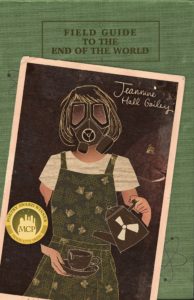
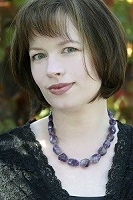 Jeannine Hall Gailey served as the second Poet Laureate of Redmond, Washington and the author of Becoming the Villainess, She Returns to the Floating World, Unexplained Fevers, The Robot Scientist’s Daughter, winner of the Moon City Press Book Prize, Field Guide to the End of the World, and the upcoming Flare, Corona from BOA Editions. She’s also the author of PR for Poets, a Guidebook to Publicity and Marketing. Her work has been featured on NPR’s The Writer’s Almanac, Verse Daily and The Year’s Best Fantasy and Horror. Her poems have appeared in The American Poetry Review, The Iowa Review, and Prairie Schooner.
Jeannine Hall Gailey served as the second Poet Laureate of Redmond, Washington and the author of Becoming the Villainess, She Returns to the Floating World, Unexplained Fevers, The Robot Scientist’s Daughter, winner of the Moon City Press Book Prize, Field Guide to the End of the World, and the upcoming Flare, Corona from BOA Editions. She’s also the author of PR for Poets, a Guidebook to Publicity and Marketing. Her work has been featured on NPR’s The Writer’s Almanac, Verse Daily and The Year’s Best Fantasy and Horror. Her poems have appeared in The American Poetry Review, The Iowa Review, and Prairie Schooner.